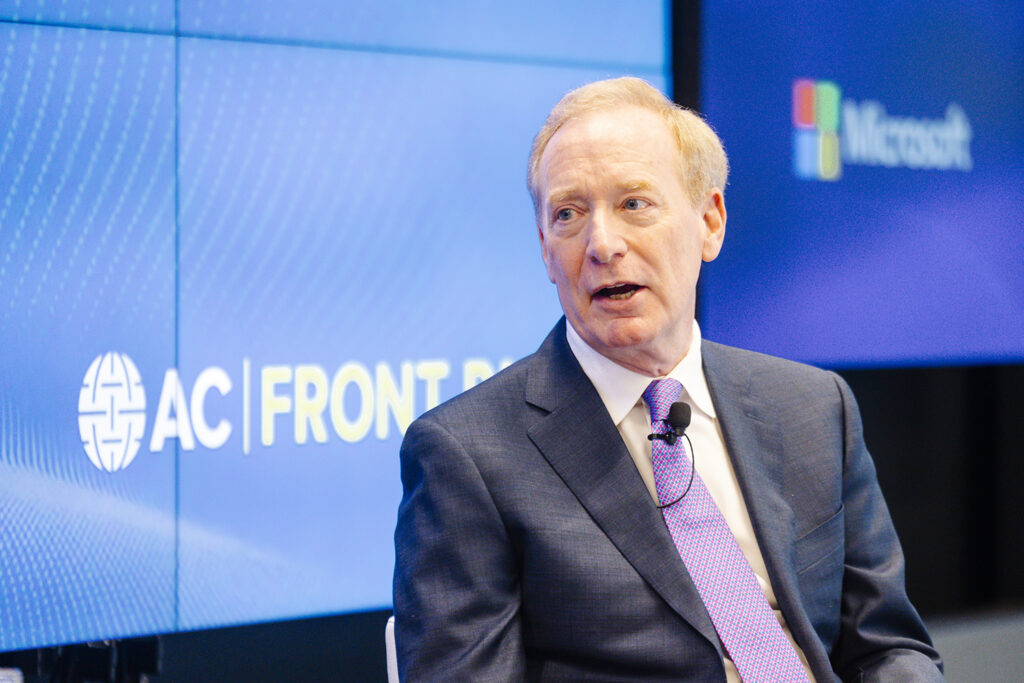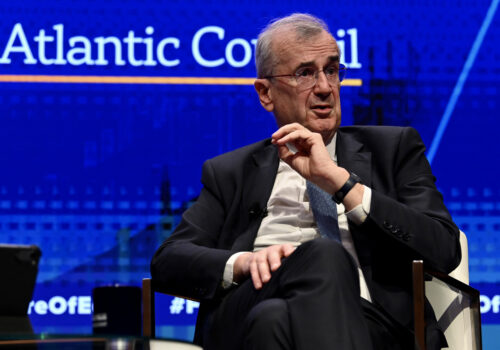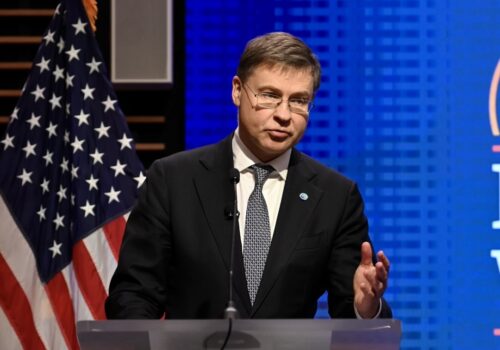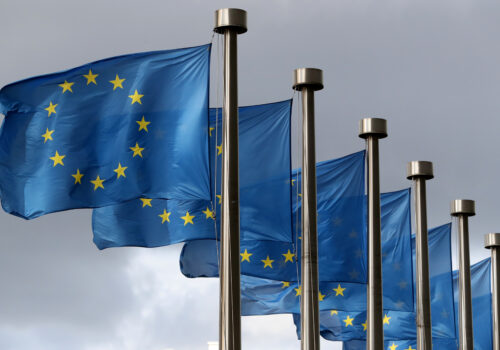Watch the event
Should “any government” issue an order that aims to compel Microsoft to cease its operations in Europe, the company “will go to court,” Brad Smith said. “We will take every legal avenue to contest any such order.”
Smith, vice chair and president of Microsoft, spoke at an Atlantic Council Front Page event in Brussels on Wednesday, where he outlined the company’s five new commitments to Europe in this age of geopolitical volatility.
Among these new initiatives was a commitment to support Europe’s digital resilience, no matter what happens geopolitically. “It’s important for us as a business to be a voice of reason across the Atlantic,” Smith said.
The European Union (EU) is slated to say on Thursday that decoupling from the United States in the realm of technology is “unrealistic.”
However, Smith added that he believes that an order that pushes Microsoft to suspend its Europe operations is “exceedingly unlikely.” Smith said that the US officials he had recently spoken with in Washington seemed surprised to hear about European concerns that the US government might one day shut off Europe’s access to US technology.
“Europeans need to be able to count on us,” Smith said.
Below are more highlights from the conversation, moderated by Atlantic Council Senior Resident Fellow Mark Scott, during which Smith debuted Microsoft’s five commitments to Europe and talked about the US-EU relationship.
His vows
- One commitment Smith announced is a promise to help build the artificial intelligence (AI) and cloud ecosystem across Europe by expanding Microsoft data center capacity by 40 percent over two years, in partnership with European companies and countries. Such collaboration, Smith added, supports an ecosystem of “sovereign” cloud data centers.
- He said that in the event Microsoft’s operations in Europe are threatened, the company will “put in place business continuity partnerships” so that its European partners can access Microsoft code and can continue services for European customers.
- The Microsoft chief said that the company is “committed to respecting” Europe’s laws, including its competition law and Digital Markets Act. “We respect the fact that European governments will make their own decisions . . . We will adapt, and we’ll be supportive of whatever they decide.”
- Smith vowed to protect the privacy of European data. In addition, he pledged to strengthen Europe’s economic competitiveness, “including for open-source developers, open-source code, [and] open-source models.” That, he said, extends to AI, which he said “will impact every part of the economy.” That means Europe will need it to bolster its competitive edge.
- Smith also said that Microsoft will look to bolster Europe’s cybersecurity, noting the company’s efforts to support Ukraine’s cybersecurity by evacuating its data to other data centers across Europe and through other forms of assistance. He also announced the creation of a new role, the deputy chief information security officer of Europe, to address European needs.
‘A bridge across the Atlantic’
- With so much geopolitical volatility, Smith said, the business sector “needs to be a bridge across the Atlantic,” to help governments “find a common path.”
- As the US-EU relationship continues to shift, particularly regarding trade, Smith said that he does not anticipate any changes in the trade relationship to disrupt Microsoft’s supply. “The economics of the cloud are actually easier to manage than, say, the economics of digital devices like laptops or other things that may come from, say, China,” he explained.
- Smith said he believes there are opportunities in cybersecurity and data privacy for the United States and EU to cooperate more closely. He cited agreements the United States has struck with the United Kingdom and Australia, under the framework of the Clarifying Lawful Overseas Use of Data Act (CLOUD Act), which allows US law enforcement to request data stored overseas in investigations.
- “We’ve long supported and advocated for an agreement between the US and the EU,” Smith said. “Let’s get that done this year.”
- Smith talked about a theory that economic crises happen every eighty years—because the generation that experienced the former crisis passes away, taking lessons with them. Meanwhile, NATO, the Bretton Woods institutions, and other pillars of the transatlantic relationship are all around eighty years old and under increasing strain.
- “There, quite rightly, are people on both sides of the Atlantic and in the world today who look back and see enormous opportunities for improvement,” he said. “But let’s not forget what led us to create it in the first place.”
Katherine Golden is an associate director of editorial at the Atlantic Council.
Watch the full event
Further reading
Thu, Apr 24, 2025
France’s François Villeroy de Galhau on a US recession: ‘Bad news for the US is bad news for all, including for Europe’
Transcript By
The governor of the Banque de France, speaking at the Atlantic Council, said that the European Central Bank would likely cut interest rates further this year.
Thu, Apr 24, 2025
In defense of ‘boring’: A European leader’s message to Trump
Inflection Points Today By Frederick Kempe
EU Commissioner for Economy and Productivity Valdis Dombrovskis spoke at the Atlantic Council in Washington on April 23, making the case for greater predictability.
Tue, Apr 8, 2025
Europeans are responding to Trump by rallying around the EU flag
New Atlanticist By
The Trump administration’s stances toward Europe have led to increased support for the European Union among the bloc’s citizens.
Image: Brad Smith, vice chair and president of Microsoft, speaks at an Atlantic Council Front Page event in Brussels on April 30, 2025. Photo via Melting Prod/Microsoft.




